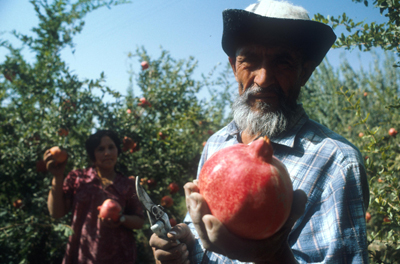Learning Skills to Develop Forests and Reduce Carbon in the Kyrgyz Republic and Tajikistan

Summary
Developing forested areas offers many interrelated environmental and other socioeconomic benefits. Increased biodiversity, soil conservation, jobs, firewood, and building materials for the rural poor work together to create a virtuous cycle—the more forests, the more benefits; and the more benefits, the more forests. National plans in both the Kyrgyz Republic and Tajikistan give priority to the development of forested areas, and link these activities to carbon sequestration and carbon-trading activities that can provide critical intermediate funding for broader forestry goals.
Facing complex international carbon-financing and sequestration requirements, forest authorities and specialists in the Kyrgyz Republic and Tajikistan asked the World Bank to help identify a country with expertise in forest management and carbon trading that could share its experiences. With the help of funding through the South-South Facility, the World Bank facilitated a knowledge exchange with forestry experts in Moldova, a country that had registered carbon sequestration projects through the Kyoto Protocol’s Clean Development Mechanism (CDM).
This exchange linked forestry institutions and individuals who had fallen out of contact after the collapse of the Soviet Union; and helped forest management officials and experts in the Kyrgyz Republic and Tajikistan implement trial afforestation programs and learn how to register for the CDM. These strengthened networks will also increase regional capacity to achieve forest management and carbon sequestration goals through a number of international forums.
“The Moldovan experience in getting two projects registered for the CDM … is a real success story and should be used as a useful learning opportunity for other countries,” Andrew Michael Mitchell, World Bank project Task Team Leader, said in his evaluation of the exchange. “This knowledge exchange is extremely replicable. Moldova has even been used for training purposes by the BioCarbon Fund.”
Beneficiaries / Participants
Development of forest areas yields a number of benefits: afforestation generates rural labor, and the products arising from renewed forests—such as firewood and inexpensive building materials—benefit the poor. Afforestation also makes use of marginal land, so it helps protect fragile environments and promotes biodiversity and soil conservation.
Revenue generated from carbon sequestration and global carbon trading activities can help secure intermediate financing to support longer-term forest management goals, and can also be shared with the rural poor. Afforestation, reforestation, and carbon trading are thus all linked in the Kyrgyz Republic’s Country Development Strategy and its National Action Plan on Forestry Development, and in Tajikistan’s State Program on Forestry Development. To participate in global carbon trading activities, countries must implement the Kyoto Protocol’s Clean Development Mechanism (CDM), a process involving several stages: project design, validation, verification, and certification.
At the request of the Kyrgyz Republic and Tajikistan, the World Bank helped to link Kyrgyz and Tajik authorities with a regional neighbor, Moldova, which had achieved notable successes in forest management and afforestation of degraded lands, including registering two projects for the CDM. This exchange aimed to help national forest authorities and specialists in the Kyrgyz Republic and Tajikistan to learn from their peers in Moldova about forest management policies and how to register for the CDM.

 China
China Colombia
Colombia Denmark
Denmark India
India Indonesia
Indonesia Mexico
Mexico Russian Federation
Russian Federation Spain
Spain United Kingdom
United Kingdom